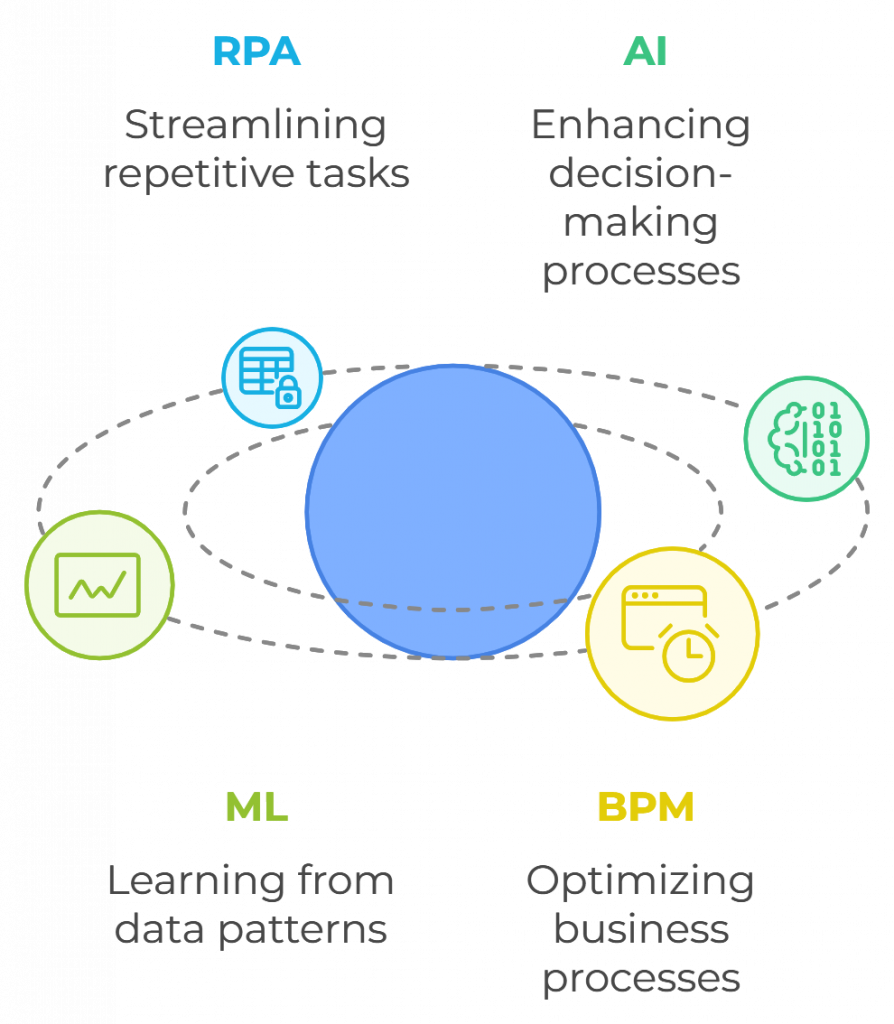Experion leads the way in turning groundbreaking technologies into everyday solutions. With hyperautomation, we help businesses reach new heights in efficiency and innovation. Automation has become an essential aspect of streamlining operations and boosting productivity. However, it goes a step further, taking automation to the next level by combining various advanced technologies to create a more comprehensive and intelligent solution. While traditional automation, such as Robotic Process Automation (RPA), focuses on automating specific, rule-based tasks, hyperautomation involves integrating a range of technologies—AI, machine learning, intelligent document processing, and more—to extend automation capabilities across an organization. This approach represents a significant evolution from traditional automation models, with the potential to revolutionize operations across industries.
Hyper Automation: Beyond RPA
The term ‘hyperautomation’ emphasizes the enhancement of traditional automation approaches. Unlike RPA, which is largely limited to automating repetitive, rule-based tasks, hyperautomation utilizes a wide array of technologies that enable automation to handle complex and dynamic processes. Some of these technologies include:
- Artificial Intelligence (AI): By incorporating AI, hyperautomation gains the ability to make intelligent decisions, process data faster, and automate more complex tasks that traditionally require human cognitive skills. For example, AI-driven automation can analyze customer inquiries and provide personalized responses, enhancing customer support efficiency and quality.
- Machine Learning (ML): Machine learning algorithms add adaptability to automation. ML processes large volumes of data to detect patterns and predict outcomes, enabling systems to adjust workflows based on real-time data. This capacity for adaptive automation is vital for industries where trends and variables change rapidly, such as finance, healthcare, and retail.
- Intelligent Document Processing (IDP): With IDP, hyper-automation can manage unstructured data—such as invoices, contracts, and emails—by extracting essential information and automating document processing. This capability allows businesses to streamline operations like invoice processing, where data extraction and categorization traditionally required significant manual effort.
- Business Process Management (BPM): BPM software enables organizations to model, analyze, and optimize business processes, providing a structured framework for identifying automation opportunities. By integrating BPM into hyper automation, companies can continuously refine and enhance their workflows, aligning them with evolving business needs.
Key Benefits of Hyper Automation
Hyper automation offers numerous advantages, particularly for organizations seeking to stay competitive in an increasingly digital and data-driven market. The key benefits include:
- Increased Efficiency: Hyper automation minimizes repetitive and manual tasks, freeing employees to focus on high-value, strategic initiatives. By automating a greater variety of processes, businesses can achieve substantial time and cost savings.
- Enhanced Accuracy: Automation eliminates the human error often associated with repetitive tasks, such as data entry, leading to improved accuracy in data handling and decision-making.
- Faster Time to Market: Hyper automation enables companies to accelerate product development and shorten time-to-market by automating processes across the development lifecycle. This efficiency allows businesses to respond quickly to market demands and maintain a competitive edge.
- Improved Customer Experience: Automated customer service processes, such as chatbots powered by AI, can provide faster, more accurate responses to customer inquiries, enhancing satisfaction and loyalty.
- Data-Driven Decision Making: Hyper automation generates insights from data that are invaluable for strategic planning and operational optimization, enabling organizations to make informed, data-backed decisions.
Challenges and Considerations
Despite the numerous benefits, implementing hyperautomation also presents several challenges that organizations must consider:
- Initial Investment: Deploying hyperautomation requires significant upfront investment in technology infrastructure, software, and skilled personnel. This initial cost can be a barrier, especially for smaller organizations.
- Complexity: Integrating multiple technologies and managing complex automation workflows requires careful planning and continuous oversight. Ensuring smooth coordination between AI, ML, BPM, and other components can be challenging without a robust strategy.
- Change Management: Transitioning to hyperautomation involves changes in work practices and roles, necessitating effective change management. Organizations must prepare employees for new workflows and adapt to the shifting balance between automated and human-driven tasks.
- Ethical Considerations: As automation becomes more advanced, ethical concerns such as job displacement and bias in AI algorithms need to be addressed. Companies should ensure that their use of hyperautomation aligns with ethical standards and corporate responsibility.
Why Choose Experion?
Experion Technologies has taken the lead in leveraging hyperautomation to provide enhanced services to clients across diverse industries. By offering hyperautomation as a comprehensive service, Experion combines its expertise in RPA, AI, ML, and BPM to deliver seamless, intelligent automation solutions. Experion’s approach to hyperautomation integrates advanced automation tools with a strategic vision that aligns with each client’s unique needs, allowing businesses to harness the full potential of automation while ensuring flexibility and scalability.

At Experion, hyperautomation is not merely a technology upgrade; it’s a pathway toward digital transformation and a smarter, more efficient business. Each hyperautomation project begins with a thorough assessment of the client’s operations, followed by the design and implementation of custom automation solutions tailored to optimize workflows and reduce costs. With hyperautomation, Experion clients have achieved enhanced productivity, minimized errors, and improved customer service quality.
The hyper automation service at Experion also emphasizes ethical and responsible use of automation technology. By maintaining a human-centric approach, Experion ensures that automation projects enhance human skills rather than replace them, fostering a collaborative environment where technology and people work in tandem. As the demand for hyper automation continues to grow, Experion remains at the forefront, committed to driving digital innovation while maintaining the highest standards of quality and responsibility.
With hyper automation as a service, Experion empowers organizations to stay agile, competitive, and ready for the challenges of the digital age.
Experion doesn’t just automate; we elevate. Through hyper automation, we’re crafting a future where technology amplifies human potential, delivering results that inspire.

